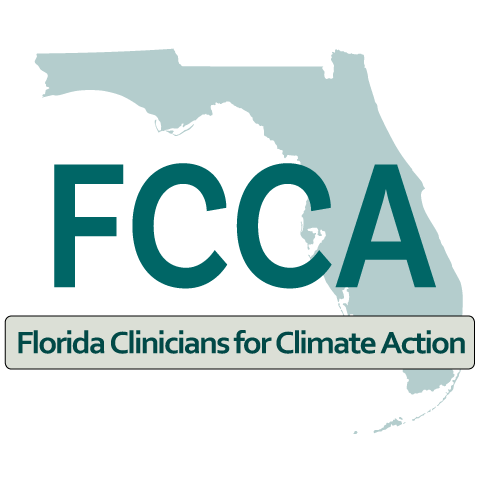The Tampa Declaration on Climate and Health
 At the Climate and Health Equity Symposium sponsored by the W. Montague Cobb/NMA
Health Institute, National Medical Association, the Medical Society Consortium on Climate
and Health, and Physicians for Social Responsibility-Florida, on January 27, 2018, in Wesley
Chapel, Florida, members of health professional organizations, hospitals, public health
organizations and health systems convened to discuss the health impacts of climate change in
Florida. The physicians formed a new group, Florida Clinicians for Climate Action, in
response to what health professionals are experiencing in patient care settings throughout
Florida.
At the Climate and Health Equity Symposium sponsored by the W. Montague Cobb/NMA
Health Institute, National Medical Association, the Medical Society Consortium on Climate
and Health, and Physicians for Social Responsibility-Florida, on January 27, 2018, in Wesley
Chapel, Florida, members of health professional organizations, hospitals, public health
organizations and health systems convened to discuss the health impacts of climate change in
Florida. The physicians formed a new group, Florida Clinicians for Climate Action, in
response to what health professionals are experiencing in patient care settings throughout
Florida.
Issued in Tampa, Florida
January 27, 2018
We are forming Florida Clinicians for Climate Action and issue this statement due to concerns about what we are experiencing in patient care. As Florida clinicians, we know::
- Human influence on the climate is clear
- Climate change is real
- It is already affecting the health and lives of Floridians, and these impacts will increase in the future
- The State of Florida is vulnerable already to the effects of climate change including: excessive heatwaves; sea level rise; frequent, more severe hurricanes; and insect vectors spreading diseases such as the Zika virus.
- It is imperative that Floridians take steps to reduce heat-trapping pollution in order to shift to a healthy, sustainable future with a stable climate.
As leading healthcare providers, professionals and organizations, we know that the health impacts of climate change, such as heat stroke, severe weather injuries, and increased asthma and allergies, will continue to rise if we don’t take action. The burden will fall on the most vulnerable, such as the elderly, children, and pregnant women, people with chronic health conditions and those with fewer resources. Ironically the people who are most economically vulnerable have typically contributed the least to greenhouse gas emissions.
According to a prestigious medical journal, The Lancet, climate change is the greatest global health threat of the 21st century. Its 2017 report recognizes that Florida has taken great steps in strengthening its infrastructure to make it more climate-resilient, which resulted in less damage than expected from Hurricane Irma. However, there remains much to be done to address the impacts of climate change, including its health effects.
We must prevent more catastrophic health effects, including infections from water- and foodborne agents or insect vectors; exacerbation of cardiac and respiratory conditions from heat or poor quality air; and psychological dysfunction from loss of property or social networks.
What is good for the climate is good for health. By decreasing greenhouse gases through clean energy solutions such as energy efficiency, wind and solar energy, we can address the causes of climate change and generate health benefits for Florida residents and people who live in other states.
Given the gravity and urgency of the situation - and the opportunity to promote public health by addressing climate change - we call on our colleagues in public health organizations, health professional associations, hospitals, and health systems to act in concert with the 2011 Durban (South Africa) Declaration on Climate and Health and endorse this Call to Action.
We commit that we will:
- Provide Leadership: As representatives of our organizations, we will drive the agenda for climate and health, promoting this Call to Action throughout Florida.
- Engage and Inform: We will engage and inform our constituencies of doctors, nurses, public health workers, hospitals, health systems and health policymakers about the health risks from climate change, and the health benefits of climate action. As health professionals, we will also serve as messengers to our patients, our communities and our governments about the major health impacts of climate change and the steps they can take to both limit their impact and to prevent the problem from worsening.
- Mitigate: We will lead by example and reduce the carbon footprint of our own institutions, practices, and activities. We will strive to make our hospitals greener and healthier by reducing waste and investing in energy efficiency and clean energy while promoting sustainable transport and resource consumption. By doing so, we commit to demonstrating how our societies can move toward carbon neutrality.
- Adapt: We will strive to make our health systems more resilient and capable of withstanding and responding to the human toll of natural disasters and the shifting burden of disease.
- Advocate Locally and Statewide: We will work within our communities and throughout Florida to advocate for emissions reductions and/or low-carbon development strategies that promote both a healthy climate and public health. We will call for solutions that reduce the local health impacts of fossil fuels; solutions that foster clean energy and social justice; and solutions that save lives and money while protecting public health from climate change.
In furtherance of these goals, we hereby establish the Florida Clinicians for Climate Action and pledge to work with like-minded organizations to advocate to preserve and improve the health of all Floridians who are likely to be negatively impacted by climate change, especially vulnerable populations and communities.
